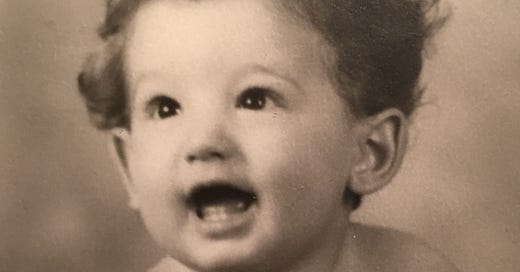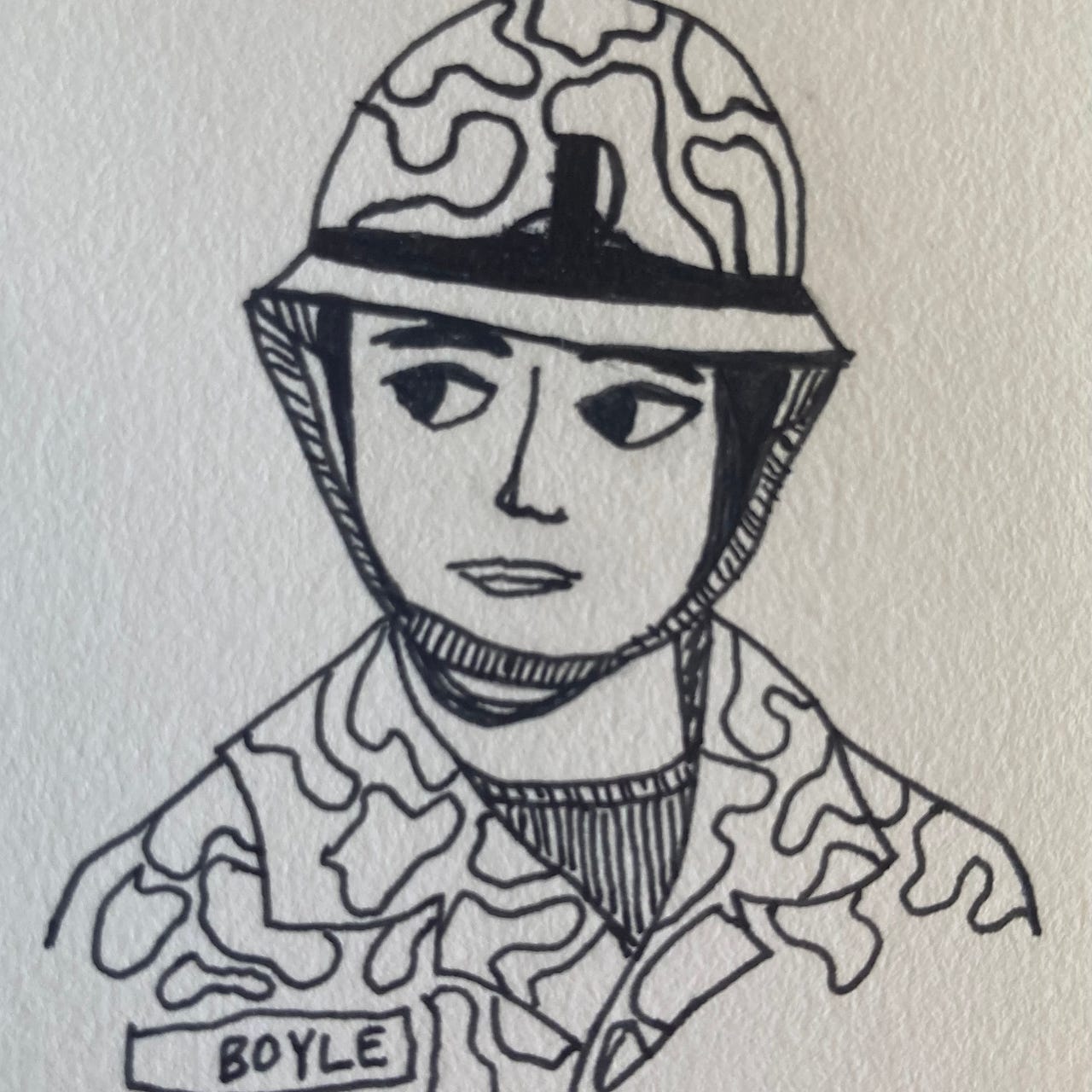Ranter’s Headnote:
On the first day of some of my college courses, I assign students a bit of homework due the next class meeting. I call the assignment a “Personal Socio-Economic Introduction.” The task is simple. I ask students to call their parents (or primary caregivers) and conduct a simple interview: ask them about 1) their level of education and 2) what they do for a living. (You’d be surprised by how many students don’t really know these basic things about their parents.)
After students get that bit of information from their parents, the next part of the interview is to ask about the level of education and working life of their parents’ parents (that is, both sets of the student’s grandparents). And then ask about your parents’ grandparents (that is, four sets of the student’s great-grandparents). And so on in the family history until the parents just don’t know anymore. (If nothing else, it’s a great exercise in finding out a little about your family tree.)
By and large, students are able to trace their family educational and work history only as far back as their grandparents—and not always even that far. Occasionally, some students discover a few interesting details about their great-grandparents. Almost never do their investigations reach beyond a generation or two. (And, yes, it’s sobering how fast we forget our direct ancestors.)
In the next class meeting, then, I have each student introduce herself or himself by recounting the findings of these interviews. Hence the label “Personal Socio-Economic Introduction.” In this way, not only do students find out a lot about themselves, but they find out a lot about their classmates—where they’re from, what their social circumstances are, what views and attitudes they might hold. I begin this class session by recounting my own family’s educational and work history.
All in all, I’ve always found that this assignment produces a lovely effect of, let’s call it, bonding contextualization. That is, we realize that we all come from somewhere and someone—situations we had no say in and people we had no control over—and such circumstances have a whole lot to do with where and who we are now. That’s a good educational place to start off a semester.
And so why am I telling you all of this? Because I’m about to embark on my own extended version of this exercise—that is, the kind of cultural self-analysis that leads to an increase in my personal and social awareness.
My Project:
What I plan to do is, every so often, write a post where I apply any and all kinds of cultural theory to myself. To my own background and circumstances and life events. For this project, my mantra will be:
Theorist, theorize thyself!
These installments will not be any kind of memoir, confessional, or autobiography. That would be tedious for us both. What each installment will be is a brief cultural scrutiny of Moi.
Likely, these episodes will be generally chronological—although I’ll probably skip around some in my timeline. At this point, I don’t know how many of these things I’ll write or what exactly they’ll be about. Like Indiana Jones, I’m making this up as I go along. (A mantra for life in general.) But I do know that these posts will be all about the intersection of me amid the larger socio-economic forces around me.
Just for educational kicks, I invite you to start a project like this of your own. Think of it as an exercise in pondering the very big question of: Just where and how do I fit in The Regime?
I have a pretty good idea of where, personally and culturally, I fit in The Regime. My suspicions are reflected in the title I’ve given my Project, that title being:
One Lucky Idiot.
Yep, that’s me all right. What do I mean by it? Not completely sure. Just a hunch at this point. Let’s explore together.
One Lucky Idiot
Installment #1: Born Lucky
I was born a Caucasian boy in 1954 in Pocatello, Idaho, U.S.A.
How lucky can you get?
I know, at first blush, hitting the ground in Pocatello, Idaho doesn’t sound like a stroke of luck. But, as chance would have it, it worked out well for me.
During the 1950s, the population of Pocatello averaged around 27K. Miniature, I know. But by Idaho standards, megalopolis. At that time, Pocatello and Boise were vying to be the biggest city in Idaho. (Boise has since left Pocatello in its dust with a current population of about 250K; meanwhile, Pocatello languishes at barely over 59K.) This biggest-city competition was a result of Pocatello enjoying, for a while, the fruits of being a post-World War II boom town.
A happenstance of tremendous importance to the wellbeing of my family.
During the war, Pocatello’s railroad yards grew from being an important freight junction into serving as a major logistical hub. Why? Geographically, it was far enough inland to be considered unreachable by Japanese bombers. The Navy built a huge Ordinance Plant in Pocatello, mainly manufacturing and refurbishing enormous battleship guns. The Army Air Corps built a large airfield to train bomber crews (B-17s and B-24s) and fighter pilots (P-39s and P-47s). Not only were hundreds of jobs created by all of this war effort, but hundreds of new workers poured into and thousands of servicemen passed through Pocatello during the war.
Suddenly, the town went from being a dusty nowhere to a bustling somewhere.
After the war, both the Navy and the Army facilities were decommissioned. The Ordinance Plant was sold to private enterprise and the airfield became the Pocatello Regional Airport. With all this enhanced infrastructure, Pocatello became an attractive location for new businesses and industries. Importantly, Pocatello also boasted a two-year college that, in 1946, was elevated to a four-year institution and renamed Idaho State College (now Idaho State University). With the GI Bill coming into effect after the war, student enrollments at ISC shot up.
All of these factors, and more, went into creating a 1950s Pocatello boomtown for me to be fortunately born into.
With some groundwork laid for the larger social circumstances surrounding my arrival on earth, let’s move on to the actual assignment I give my students, that is, the Personal Socio-Economic Introduction.
Both my mother and my father were the first people in their families to go to college. Specifically, they attended—where else?—Idaho State College. My father got there on a football scholarship. My mother lived only a blocks away from campus, so she could save money by living at home.
My mother majored in Sociology and added to her degree a Teaching Certificate in Early Education. (Primary and secondary school teachers were much-needed in Idaho at the time, and women were pushed toward those positions.) My father started out as a Journalism major but switched to Sociology. After just one season on the ISC football squad (a very successful season where he started at Middle Linebacker), my father quit the team—and thus his scholarship—to focus on his studies. This meant he had to scramble to work his way through college.
Both my parents were children raised in working-class families during the Great Depression. Not fun. Although class designations are always fuzzy, I’d characterize my mother’s family as lower middle-class and my father’s family as, well, maybe a notch below that. Really not fun.
As for my mother’s working life, she taught school for a short time before becoming, as was normal then, a stay-at-home wife and mother. That became her working life. While she was always amazing at the mother part (very lucky me), she chaffed at the stay-at-home part. Later in life, after my brother and I were out of the house and off to college, my mother trained as a docent and became an educator and tour guide at the Philadelphia Museum of Art. She also worked on a Master’s degree in Art History at the University of Virginia. I know my mother would have loved to work professionally in the Art field, either as a museum curator or as a college teacher. As a woman of her generation, however, such opportunities were not readily available to her.
If my mother experienced a dearth of opportunity as a mid-20th-century American woman, my father experienced the opposite as a man. Especially as young white man with a newly minted college degree—even one from ISC.
Right out of college, my father got a job as a Management Trainee with Westvaco Chemical Company. As part of the Pocatello post-war boom, Westvaco had built a smelly and toxic Elemental Phosphorus production facility on the outskirts of town, nearby the airport. (For decades, this plant was the largest of its kind in the world.) My father began his career learning the chemical business for the bottom-up—that is, working chest-deep in hazardous sludge for eight hours a day for several months before transitioning to a suit-and-tie job in the Personnel Department.
Not long after my father went to work for Westvaco, that company was acquired by a much larger chemical and agricultural company named FMC. To make a long (and standard) mid-20th-century white man career story short, my father did an admirable job of climbing the FMC corporate ladder. So promising was this young man in the Personnel field that, in just a few short years, he was transferred back east to Corporate Headquarters in New York City. (Yeah, quite a quantum leap from Pocatello.) After a long career with FMC, my father retired, with a tidy golden parachute, as a very high mucky-muck in the Human Resources Department.
And so, what’s the upshot of my parents’ educational level and work life with regard to lucky me? Simple.
My parents did all the hard work of elevating our family into the educated middle-class—even, by the end of their lives, into the upper-middle-class. As a result, I was born into a home environment of two sociologists determined to leave behind the hardscrabble working-class life they grew up in. What is more, thanks to the boomtown environment provided by 1950s Pocatello, my parents were able to achieve their goal. Had I been born in another decade or in a more remote Idaho cow town, my story could be very different.
Again, lucky me.
The stories of my grandparents are telling to my good fortune as well. I grew up very close to my mother’s parents. These grandparents were like second parents to me. Neither of them finished high school, both dropping out and going to work when my grandmother became pregnant with my mother. Each of them, however, was talented and hardworking. My grandmother was a genius seamstress and dressmaker. My grandfather was a genius car mechanic. I’m not exaggerating. Such work was valued in Pocatello, especially after the war, so while not great-paying, employment opportunities were available to them. In due course, they opened their own small business, a truck and auto repair shop called Duke’s Service. My grandfather fixed the vehicles and my grandmother kept the books. Duke’s Service did a booming business. After running it for many years, they were able to sell the business and retire in comfort. A 20th-century American working-class success story.
From these grandparents I reaped the benefits of being in the orbit of two more adoring and supportive adults. As a kid, I remember having long conversations with Grandma sitting at her kitchen table eating homemade fudge. I remember lots of fishing with Grandpa and even one time getting to tag along duck hunting. I also got to hang out a lot at Duke’s Service, which for a kid was super cool. In high school, I worked there for a couple of summers—sweeping up, chasing parts, doing very simple mechanic jobs under Grandpa’s watchful eye.
In contrast, I was not at all close to my father’s parents, nor was their story by any measure a happy one. I never met my father’s father. He died soon after my birth. Growing up, I had little contact with my father’s mother. She lived up in Boise. All of this rupture came about because of some very dark family history—events so dark that I was never even told about them until I was in college. I realize you’re likely intrigued, but I’m not about to go into it.
The details about this set of grandparents that are pertinent to my socio-economic introduction are as follows. I have no idea if either of them finished high school. I suspect they did. What I do know is that both of them grew up on small, more or less subsistence-level ranches in the harsh high desert environment—and culture—of central eastern Idaho. Times were tough there. And then the Depression hit.
As for the working life of these grandparents, they were dirt-poor ranchers as well. They worked some family land around a tiny town called Arco. That’s where my father was born. He hated it. Both the ranching part and the tiny town in central eastern Idaho part. As the oldest son, he was expected, by way of old-world tradition, to take over the ranch. As far as my father was concerned, that would only happen over his dead body. Hence the football scholarship to Idaho State College. Hence the break with his parents. Hence my father’s grim determination to get as far away from ranch life—from Idaho itself—as possible.
All more good luck for me.
And let’s not overlook the even bigger picture here. The fact that, during the 1950s, all of America was booming. We’d won the war. We found ourselves elevated to the rank of unrivaled global superpower. (Despite its bluster, the Soviet Union was more our convenient foil than our worthy opponent.) The mid-20th-century world was our oyster. And don’t think we didn’t know it and take advantage of it.
And so, in the midst of all this red-white-and-blue boomtime, safely tucked away in little old Pocatello, I dropped in to enjoy a pretty fine Norman Rockwell childhood.
So much for the time and place of my birth.
Do we even really need to talk about the race, sex, and gender part of my luck? The Caucasian boy stuff? All right. But I’ll be quick.
I think it no exaggeration to declare that the Caucasian boy of mid-20th-century America was the up-and-coming King of the World. Even one born in Pocatello fucking Idaho. If you found yourself straight and adequately masculinized, no problem. By virtue of some happy genetics, I also turned out to be reasonably smart, tall, not a bad athlete at all, not hideous looking, and moderately humorous.
In sum, the game was mine to lose.
And even when I screwed up, I had a wide safety net below to catch and bounce me back up into the contest.
Like I said, One Lucky Idiot.
COMING IN TWO WEEKS: something reasonably smart and moderately humorous...
AND DON’T FORGET...
Read some provocative fiction. Check out and subscribe to my other Substack newsletter, 2084 Quartet at:
While you’re at it, read some provocative social commentary. Check out and subscribe to this absolute Substack gem as well:







